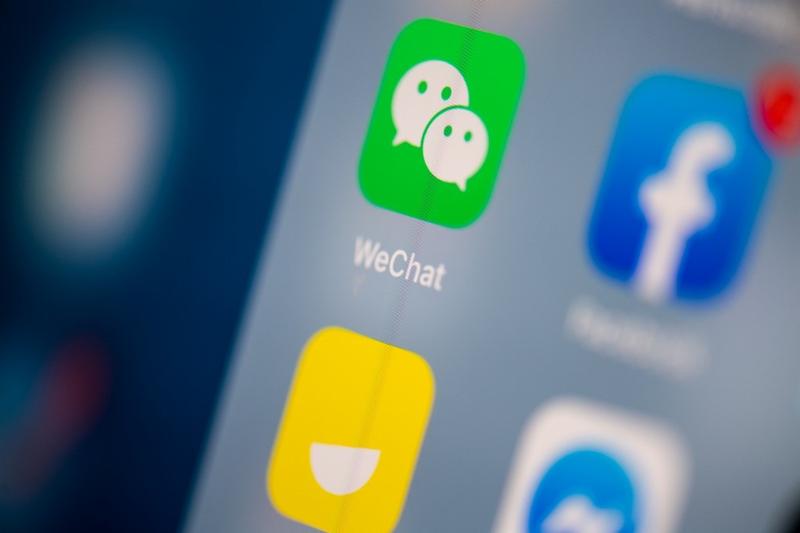 This file illustration photo taken on July 24, 2019 in Paris shows the logo of the Chinese instant messaging application WeChat on the screen of a tablet.
(MARTIN BUREAU / AFP)
This file illustration photo taken on July 24, 2019 in Paris shows the logo of the Chinese instant messaging application WeChat on the screen of a tablet.
(MARTIN BUREAU / AFP)
With the stroke of a pen, US President Donald Trump made his strategic fight with China hit home for potentially billions of people -- generating confusion, panic and fear around the globe.
The US president’s move to ban the TikTok and WeChat in just over six weeks from now sent shockwaves through the tech industry and the many American businesses who rely on the apps to sell goods in China.
I feel I’m targeted by Trump. I’m living in constant fear now thinking I might get disconnected with friends and families.
Tingru Nan, Chinese graduate student at the University of Delaware
The decision also spurred alarm on Chinese social media, with WeChat users in the US posting contact information so friends and family could reach them if the app disappeared. An online forum popular with stock investors asked users if they would give up their iPhones or WeChat if Apple Inc eliminated the app from its store: They voted to ditch their phones by a margin of 20 to one.
READ MORE: Washington urged to stop action against Chinese apps
Of all Trump’s shots against China, the executive orders against TikTok and WeChat potentially have the widest impact. Beyond the financial blow, they threaten to sever communication links among the people of the world’s biggest economies in addition to spurring a decoupling of the tech industry that could ripple around the world.
“This move points to a hegemonic war -- the US is trying to suppress China’s rise as a superpower,” said Yik Chan Chin, who researches global media and communications policy at the Xi’an Jiaotong-Liverpool University in Suzhou.
ALSO READ: WeChat app thrust into US-China tech fray
It’s hard to overstate how ingrained WeChat and Tencent are in China and among its diaspora: WeChat, which has more than 1 billion users and is owned by Tencent Holdings Ltd, is relied upon so heavily that many people have never exchanged phone numbers or emails. From Wal-Mart Inc and Starbucks Corp to the NBA and Nike Inc, nearly every major American consumer brand with business in China is deeply intertwined with Tencent and its network, which includes WeChat and investee JD.com.
Jason Gui, co-founder of San Francisco-based startup Vue Smart Glasses, said his team has to rely on WeChat to communicate with suppliers in China and a ban would be very “disruptive.” Emails sent to manufacturers in China are often unanswered for days, whereas inquiries through WeChat will get immediate attention, he said.
“When the US imposes these bans, they may not realize how intertwined the relationships between US and China have become,” he said. “Our communication lifeline with China depends on WeChat. It hurts small businesses that have limited resources to figure out how to circumvent these bans.”
Our communication lifeline with China depends on WeChat. It hurts small businesses that have limited resources to figure out how to circumvent these bans.
Jason Gui, co-founder, Vue Smart Glasses
Millions of users in the US also fear that Trump’s ban on transactions using WeChat will cut ties to families and friends in China.
“I came to the US for free access to information. I feel I’m targeted by Trump,” said Tingru Nan, a Chinese graduate student at the University of Delaware. “I’m living in constant fear now thinking I might get disconnected with friends and families.”
The ban will cut off far more than the up to 6 million Chinese people who live in the United States. In the past three months, WeChat has had an average of 19 million daily active users in the United States, according to analytics firms Apptopia.
ALSO READ: US app ban an act of banditry
Some Chinese expats in America worry that this is only the latest salvo in a worsening US-China relationship.
“My parents are more worried than me when they saw the news,” said Yun Li, a User Experience (UX) designer in Boston who is from Guangdong, China. “They also asked me to seriously consider moving back to China given the current political environment,” she added.


